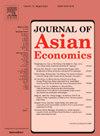儒家文化、公共教育支出与经济增长
IF 2.9
3区 经济学
Q1 ECONOMICS
引用次数: 0
摘要
儒家文化对经济结果有显著影响,但目前的研究很少深入探讨儒家文化对中国区域经济增长的影响以及政府行为的作用机制。本文从政府对公众教育需求的回应角度出发,探讨儒家文化是否会通过提高公共教育支出来促进经济增长。本文使用 2003-2018 年的县级面板数据,以历史上明清两代进士人口密度作为儒家文化的替代变量,主要通过集合 OLS 和 IV 分析进行实证分析。结果表明,儒家文化对经济增长有显著的正向影响,这可以部分地通过儒家文化对公共教育支出的正向影响来解释。在回归中控制了人力资本后,这一渠道仍然成立。对宗族文化和地方长官文化背景的进一步讨论表明,较高的公共教育支出源于地方政府对公众教育需求的被动回应。因此,建议地方政府拓宽和完善公众诉求表达渠道,在平衡公众诉求和促进经济增长的同时,增加公共教育支出。本文章由计算机程序翻译,如有差异,请以英文原文为准。
Confucian culture, public education expenditure, and economic growth
Confucian culture has been found to have significant effects on economic outcomes, yet current studies seldom delve into its impact on regional economic growth in China and the role of government behavior as a mechanism. From the perspective of government response to public demands for education, this paper examines whether Confucian culture fosters economic growth by driving up public education expenditure. Using panel data at the prefecture-level over 2003–2018 and taking the historical population density of jinshi in the Ming and Qing Dynasties as the proxy of the Confucian culture, the empirical analysis is done mainly through pooled OLS and IV analysis. Results show that Confucian culture has a significant and positive effect on economic growth, which can be partially explained by its positive influence on public education expenditure. The channel still holds after controlling human capital in regression. Further discussion of the clan culture and local governors’ cultural backgrounds suggests that higher public education expenditure results from the local government’s passive response to public demands for education. Thus, local governments are suggested to widen and improve the channels for expressing public demands and increase public education expenditure while balancing public demands and the need to boost economic growth.
求助全文
通过发布文献求助,成功后即可免费获取论文全文。
去求助
来源期刊

Journal of Asian Economics
ECONOMICS-
CiteScore
4.70
自引率
9.40%
发文量
90
期刊介绍:
The Journal of Asian Economics provides a forum for publication of increasingly growing research in Asian economic studies and a unique forum for continental Asian economic studies with focus on (i) special studies in adaptive innovation paradigms in Asian economic regimes, (ii) studies relative to unique dimensions of Asian economic development paradigm, as they are investigated by researchers, (iii) comparative studies of development paradigms in other developing continents, Latin America and Africa, (iv) the emerging new pattern of comparative advantages between Asian countries and the United States and North America.
 求助内容:
求助内容: 应助结果提醒方式:
应助结果提醒方式:


